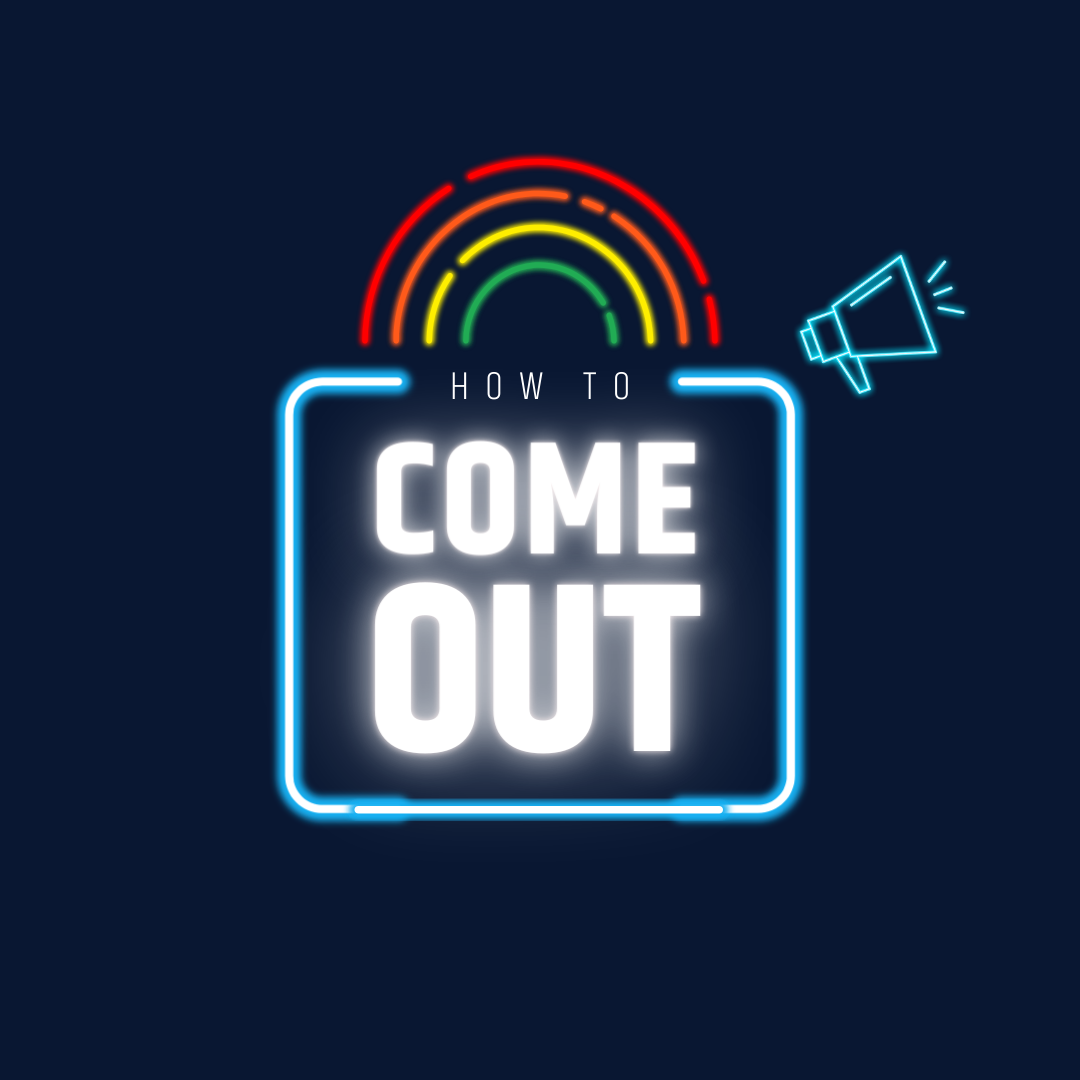
How to Come Out
Coming out is a stressful time for many LGBTQ people for several valid reasons. Even if we think friends and family will be accepting, sharing something so personal about ourselves can be very difficult. Sometimes, it requires us to change a perception someone has held about us, and that can be hard to do.
These guidelines are simply that–guidelines. Everyone’s situation will be different. And of course, assess whether or not coming out is safe for you. If waiting to come out to your parents or guardians gives you more time in a home with food and resources, maybe that is your best option. It is okay to wait to come out when it’s safer for you.
Choose how you will come out
Many people come out to friends and family in person. Of course, that is lessening over the years. Personally, I came out to most people in my life over text. The people I come out to in person the most are strangers or acquaintances–like my doctor.
The important thing is that you choose an avenue that feels best for you. If texting your friends that you’re a letter from the queer alphabet soup, then do it! There’s no shame in doing it over text.
That being said, many queer people I know told their parents or other, older family members in person. As a queer person whose primary work includes creating content for young queer people, I spend a lot of time reading LGBTQ+ nonfiction books aimed at teens. A lot of those books will advise you to do it in person too.
I’m here to say, you don’t need to come out in person. I came out to my parents via email while I was abroad for two months, and it all worked out fine. The thing is, coming out (especially to parents) can be really, really tough. Even when you know they will still love and accept you. Even when there is no risk of being kicked out or cut off financially. Changing the life trajectory they had envisioned for you is hard.
That’s also why I’m a firm believer that LGBTQ people have the right to make coming out as easy for ourselves as possible. If you come out in person, who are you doing it for? You or your parents? It’s okay to write a letter or email.

Now, it’s important to also recognize the benefits of coming out in person too. It might lend more respect to those you are coming out to. It gives you a chance to respond to questions/concerns they have right away. It shows you are mature enough to have this conversation, that you aren’t afraid or ashamed of your identity, etc.
There simply is no one right way to come out. It’s a good idea to think about which way might work best for your situation. We will keep coming back to this throughout the guide.
Reach out to someone who has already come out
Talking to someone who has already been through this is a great idea. By reading this post, you’re learning the various ways I came out as a lesbian. That’s a start. But it’s also good to have a one-on-one conversation with someone who’s been in your shoes. That way, you can ask questions.
A person who is already out is most likely going to be very willing to help. They know it’s hard and remember the struggle. As I gear up to come out as non-binary to my parents, I’ve reached out to non-binary friends (all online friends!) to hear how their coming outs went. It both helps soothe the nerves and gives some ideas of how to approach it.
Picking the “right moment” to come out
There’s a lot of pressure to choose the right moment to come out. While I might argue that there is no perfect moment, it’s still a good idea to be sensitive about your timing.
Think about the atmosphere you want to create. Do you want their full attention? Then asking them to sit down and announcing you want to tell them something creates space for that. Do you want it to be more casual? Then start the conversation with a task at hand. Maybe you are making dinner together or folding laundry. Keeping your hands busy will help keep it casual.
You might also want to consider things like:
- Will there be any interruptions at this time?
- Will we be alone?
- Is the other person (or people) dealing with something challenging right now?
Considering the emotional state of the other person can help gauge when to have this conversation. But be careful not to use this as an excuse to keep putting it off if this is truly something you’re ready to do. (I was guilty of that myself.)
Keep the coming-out conversation positive
The first few words of coming out are tricky. You want to lay the tone and groundwork for an open conversation, but remain firm on your intentions.
It’s best to give a positive impression about coming out. (As anxiety-inducing as this actual conversation might be.) The reality is, you’ve likely given much thought to your identity by this point. You want this to come across. Here are some phrases to use throughout the conversation to assert that you’ve given this a lot of thought and feel good about it:
- Mention that you have been reflecting a lot on yourself and who you are.
- Say that you’ve been thinking about this a lot.
- Explain that you feel good about this.
- Highlight the fact you want to share this news with them. Sharing your authentic self helps you connect more.

The more you affirm that this is something you’ve given a lot of thought to, the more people on the receiving end will realize this is not a phase.
Preparing for coming out
Like many things, practice helps! It can be helpful to write down what you want to say. This will help you get all your thoughts down without the immense pressure of the moment.
Of course, if you choose to come out via letter (email, text, etc.), writing it down is an essential step. But let it be a process. Write a draft first. Brainstorm what the letter will include. Have a trusting friend read it and give you feedback.
If you’re having a coming-out conversation, try rehearsing it. It may feel silly, but the more you practice this talk, the more confident you will come across. Many people you come out to–especially your parents–might feel worried about whether you are certain or not. Delivery can do a lot to demonstrate how strongly you feel about this.
Having resources on the ready is another good prep tactic. Especially when it comes to parents, they may have concerns about what this means for you, for them, and for the family. If you’re coming out as trans, have resources related to your transition goals available. Be ready to share “success stories” of happy queer people who are out. If your family is religious, try providing info for a LGBTQ-friendly religious leader of their faith.
Other coming out tips
Here’s a rapid-fire list of other coming-out tips to keep in mind:
- Try not to make it about the person you are dating if you are in a relationship. You don’t want people to assume this is a phase based on who you are dating. Try to get them to see your identity as it relates to you, not someone else.
- Tell the other person(s) know whether or not they can share this info others. (When I came out to my parents, I let them know that I was already out to my siblings. I gave explicit permission to tell other people and preferred they would do this, rather than me reaching out to extended family myself.)
- Let them know they can talk about it with you at any point. The aim is to create an open tone for future discussions.
- Understand that they will likely need time to process. You had a lot of time to come to terms with this yourself. Especially with family, they likely envisioned a different life for you and need time to adapt to that change.
Responding to objections and concerns
I hope your coming-out is easy. I hope you are met with acceptance, love, and understanding. Sometimes, it might take a moment for the other person to get there. They might have concerns. They might say the wrong thing. Here’s how to respond to those comments.
(These suggestions come from This Book Is Gay by Juno Dawson. Check out this book for how to come out and other great resources for LGBTQ youth.)
Objection: Are you sure? Is this a phase?
Response: I’ve felt this way for a long time. It’s only now that I feel comfortable sharing this with you.
Objection: You’re not gay. (Queer/trans/bisexual/etc.)
Response: I have always been gay. It just took me some time to figure that out.
Objection: Have you tried to be straight/cis? Can you try hiding this?
Response: I can’t hide this anymore. I’ve thought about this a lot and keeping this part of myself a secret wasn’t good for me.
Objection: I don’t believe this.
Response: I know this is a shock. I’ve had a lot of time to think about it, and I understand you’ll need time to process it too.
Objection: Don’t tell anyone else.
Response: I can’t promise that. I know you need time to process, but I have to be honest about who I am.
Celebrate coming out!
For many, coming out can be a very difficult task. Make sure you set aside time to celebrate this accomplishment! If you have supportive friends, ask them to spend a day celebrating with you. Plan an activity that you love doing. Get yourself a treat. Take a moment to enjoy this and allow yourself to feel pride in your identity and overcoming this challenge. You deserve it!

